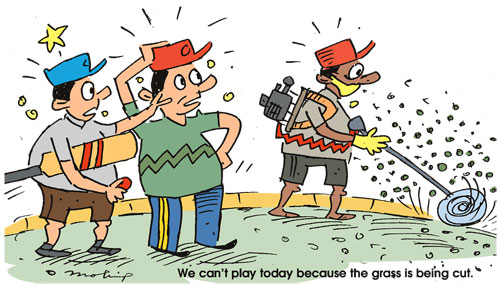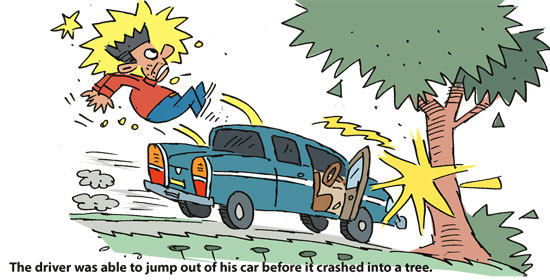|

by R. S. Karunaratne
Present progressive passive
We use the present progressive passive like the present progressive
active for things that are happening now, or for things that are planned
for the future.
Your clothes are being washed.
You are being watched.

We can’t play today because the grass is being cut.
You can’t wear your shoes because they being mended.
She didn’t get the job. She is being interviewed.
A: What time is it?
B: Sorry, I don’t know. My watch is being repaired.
A; Why are you so jubilant?
B: I am being sent on a scholarship.
I usually read a newspaper while lunch is being prepared.
Present perfect passive
We use the present perfect passive like the present perfect active to
talk about past actions and events which are important now.
Their old house has been sold.
I have been seen by the doctor.
We haven’t been invited to Mary’s wedding.
A new building has been built for the post office.
A provincial councillor has been arrested for drunk driving.
The artists’ paintings have been bought by a foreigner.
A school boy has been killed in the accident.
Two lost children have been found.
A relatively unknown actor has been chosen for the main role.
[Activity]
Make sentences about what is being done. Check your answers with the
key.
1. I can’t board the plane; my ...................... (baggage /
check)
......................................................
2. We’re waiting in a queue; our ....................... (boarding
passes / check)
......................................................
3. This is a busy time in our office. Our ...................
(business people / meet)
.....................................................
4. The car park is full. ......................... (cars / park)
.....................................................
5. The students are excited. The ................... (results /
announce)
......................................................
6. The receptionist is busy. ...................... for visitors.
(reservations / make)
.......................................................
7. The village is about to go under water.
............................ (rescue operations / make)
.......................................................
8. The robbers are running away with the loot. Police
.................... (barricades / make)
........................................................

9. The ship is sinking. Rescue ............... (operations / make)
.........................................................
10.The books are printed .......................... to distribute
them. (arrangements / make)
.........................................................
************
Key:
1. I can’t board the plane; my baggage is being checked.
2. We’re waiting in a queue; our boarding passes are being checked.
3. This is a busy time in our office. Our business people are being met.
4. The car park is full. Cars are being parked.
5. The students are excited. The results are being announced.
6. The receptionist is busy. Reservations are being made for the
visitors.
7. The village is about to go under water. Rescue operations are
being made.
8. The robbers are running away with the loot. Police barricades are
being made.
9. The ship is sinking. Rescue operations are being made.
10.The books are printed. Arrangements are being made to distribute
them.
Match words and meanings
Here’s a novel way to enrich your vocabulary. Match the words in
Column ‘A’ with their meanings in Column ‘B’ and check your answers with
the key. The first one has been done for you.
[Column A]
Y 1. bumpy
... 2. bungalow
... 3. bungle
... 4. bunk
... 5. bunker
... 6. bunny
... 7. bunting
... 8. buoyant
... 9. burden
... 10. burgeoning
... 11. burglar
... 12. burial
... 13. burly
... 14. burn
... 15. bursar
... 16. bursary
... 17. burst
... 18. bust
... 19. bustle
... 20. butcher
... 21. buzzer
... 22. bygone
... 23. bypass
... 24. byway
... 25. Byzantine
***********
[Column B]
A. an electronic device that makes a buzzing sound
B. belonging to a past time
C. to ignore a rule or official authority
D. a small road
E. difficult to understand
F. a person who sells meat in a shop
G. to do things in a hurried way
H. a statue of the head and shoulders of a person
I. to break open suddenly
J. a sum of money given to a person to study
K. the person in a university controlling its money
L. to be damaged by fire
M. large and strong
N. the act of putting a dead body into the ground
O. a person who illegally enters buildings and steals things
P. developing quickly
Q. a heavy load that you carry
R. happy and confident
S. rows of brightly coloured little flags
T. rabbit
U. a shelter usually underground
V. a narrow bed fixed to a wall
W. to do something wrong in a careless way
X. a house that has only one storey
Y. not smooth
*************
Key:
2. X 3. W 4. V 5. U 6. T 7. S 8. R 9. Q 10. P 11. O 12. N 13. M 14. L
15. K 16. J 17. I 18. H 19. G 20. F 21. A 22. B 23. C 24. D 25. E
Starters:
How to express ability
We use ‘can, could’ and ‘be able to’ to say that somebody has an
ability or an opportunity to do something.
A. R. Rahman can play many musical instruments.

You can go to the music room and play the piano.
We can learn English if we are really interested in it.
Children can learn languages more easily than adults.
Rich people can help poor children financially.
In the present tense, ‘be able to’ is more formal and less usual than
‘can.’
Ehansa can write beautiful essays.
She is able to write short stories.
Some people can climb trees.
Sam is able to climb trees.
We can contact our friends using the Internet.
We are able to meet our friends at the party.
In some structures, we always use ‘be able to,’ not ‘can.’
It's nice to be able to attend school.
Sam might be able to help us in this matter.
I have been able to get a job for my sister.
The Education Minister has been able to improve the secondary education.
I am happy that I have been able to help two poor children.
For the future we use ‘can’ or ‘will be able to’ but not ‘will can.’
You can get a job if you know English.
We will be able to find jobs in Australia.
Hema can get a promotion if she works hard.
The army will be able to capture the lost territories.
You can lose your life in a serious accident.
We use ‘could’ or ‘was / were able to’ to express ability or
opportunity in the past.
Amanda could play the violin when she was six.
I was able to find my lost passport.
We were able to swim across the Mahaweli river.
My grandfather could climb trees when he was young.
We could memorise poems when we were children.
In some constructions we use only ‘was / were able to’ but not ‘could.’
I was able to pass the GCE Advanced Level Examination after several
attempts.
Luckily we were able to return home before the rain.
The driver was able to jump out of his car before it crashed into a
tree.
Natasha could swim when she was seven. (a past ability)
Natasha was able to swim when she was seven. (a past action)
In negative sentences we use ‘couldn't’ or ‘wasn't / weren't able
to.’
The plane couldn't take off due to fog.
The plane wasn't able to take off due to fog.
I couldn't participate in some sports due to illness.
I wasn't able to participate in some sports events due to illness.
The river was in spate, so we couldn't swim.
We usually use ‘could’ not ‘was / were able to’ with verbs of seeing or
thinking.
I could see the house on fire.
Lalin could smell gas when he went to the kitchen.
We couldn't understand anything he said.
[Activity]
Put in ‘could’ or ‘was / were able to’ in the blanks. Use negatives
if necessary. Check your answers with the key.
1. There was an unannounced power-cut. We .......... see anything.
2. The engine stopped suddenly, but luckily the driver ............
start it again.
3. There was a political meeting last night. We ............. hear the
speeches very clearly.
4. People heard warnings about tsunami, and they ................. move
out in time.
5. The bus was full. Nethmi ........... to find a seat anywhere.
***************
Key:
1.couldn't 2. was able to 3. could 4. were able to 5. couldn't / was
unable to
Quiz on idioms
An idiom is a special kind of phrase. It is a group of words which
have a different meaning when used together from the one it would have
if the meaning of each word were taken individually. Read the idioms in
bold type and tick the meaning you think is correct. Check your answers
with the key.
1. If everything is in apple pie order ...
(a) everything is neat, tidy and well-organised
(b) everything is in a mess
(c) all the apples are good
2. If you compare apples with oranges ...
(a) things are similar in appearance
(b) things are very familiar
(c) things are completely different
3. If you're tied to your mother's apron strings ...
(a) you're independent
(b) you're dependent
(c) you don't know what is happening
4. If you say something is a grey area ...
(a) you say it is unclear
(b) you say it is very clear
(c) you say you're trying to understand it
5. If something is out of the ark ...
(a) it is popular
(b) it is outdated
(c) it is unclear
6. If you keep somebody at arm's length ...
(a) you avoid being friendly with them
(b) you are friendly with them
(c) you meet them occasionally
7. If something costs an arm and a leg ...
(a) it is dangerous
(b) it is cheap
(c) it costs a lot of money
8. If somebody is twisting your arm ...
(a) they're trying to harm you
(b) they are trying to persuade you to do something
(c) they are trying to trample you
9. If you're up in arms about something ...
(a) you're very angry about it
(b) you're very happy about it
(c) you're very unhappy about it
10. If you welcome somebody with open arms ...
(a) you're very pleased to see them
(b) you pretend to know them
(c) you dislike them
***********
Key:
1. (a) 2. (c) 3. (b) 4. (a) 5. (b) 6. (a) 7. (c) 8. (b) 9. (a) 10.
(a) |

